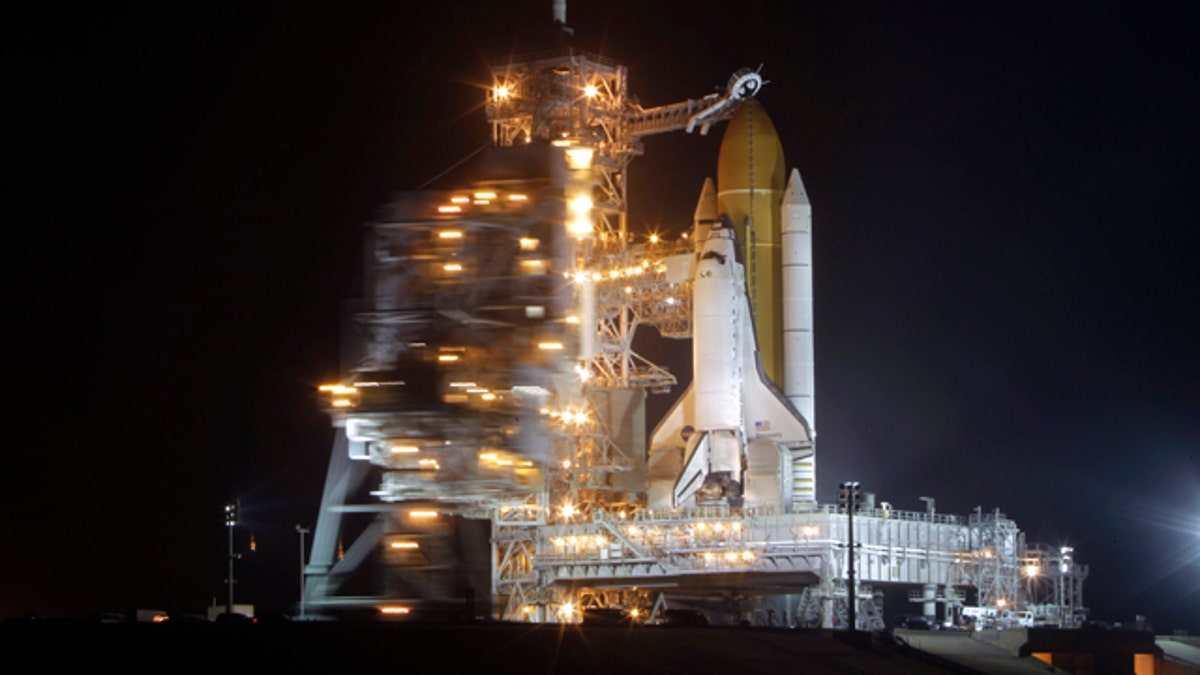
Space shuttle Discovery stands ready for launch at Pad 39A as the rotating service structure is moved back to expose the orbiter at the Kennedy Space Center in Cape Canaveral, Fla., Wednesday, Feb. 23, 2011. (AP Photo/John Raoux)
CAPE CANAVERAL, Florida – NASA's most traveled space shuttle, Discovery, was fueled Thursday for its final voyage after nearly three decades of service.
NASA finished pumping hundreds of thousands of gallons of fuel into Discovery at midmorning, as the six astronauts assigned to the space station delivery mission got ready at crew quarters for the late afternoon liftoff. It was their second stab at this. November's launch attempt never made it this far.
Launch director Mike Leinbach said everything finally seemed to be coming together. Even the weather was looking up: the forecast improved to 90 percent "go" for the 4:50 p.m. (2150 GMT) liftoff.
"I think the weather's going to be good," Leinbach said Thursday morning. "It's a machine so you never know until the final seconds on the clock if all pieces of the machine are going to behave. But right now, it feels good."
This time, no hydrogen gas seeped out during fueling. NASA also was confident no cracks would develop in the external fuel tank. Both problems cropped up during the initial countdown in November, and the repairs took almost four months. The cracks in the midsection of the tank, which holds instruments but no fuel, could have been dangerous.
Discovery will head to the International Space Station with the crew, as well as a load of supplies and a humanoid robot.
This will be the 39th flight for Discovery, set to become the first of the three surviving space shuttles to be retired this year and sent to a museum. It has since logged 143 million miles (230 million kilometers) since its first flight in 1984.
NASA expects 40,000 guests on hand for Discovery's farewell launch, including a small contingent from Congress. Watching with special interest from Mission Control in Houston will be astronaut Timothy Kopra, who was supposed to be the flight's lead spacewalker. He was hurt in a bicycle crash last month and was replaced by Stephen Bowen, who will become the first astronaut to fly back-to-back shuttle missions.
Well before dawn, recreational vehicles already lined nearby roads offering the best views of liftoff. Signs outside businesses and government offices in the neighboring towns of Cape Canaveral and Cocoa Beach offered words of encouragement. "The heavens await Discovery," one church proclaimed. Local grocery stores stocked up on extra red, white and blue cakes adorned with shuttle pictures.
Leinbach noted that it would be "tough" to see Discovery soar one last time. "What will be most difficult will be on landing day when we know that that's the end of her mission completely," he said.
Discovery will spend 11 days in orbit -- on top of the 352 days it's already spent circling the planet -- and will rack up another 4.5 million miles (7.2 million kilometers).
Its list of achievements include delivering the Hubble Space Telescope to orbit, carrying the first Russian cosmonaut to launch on a U.S. spaceship, returning Mercury astronaut John Glenn to orbit, and bringing shuttle flights back to life after the Challenger and Columbia accidents.
"She's been an amazing machine," Leinbach said Wednesday. "She's done everything we've asked of her."
Heading up Discovery's veteran crew is retired Air Force Col. Steven Lindsey. Two of his crew actually lived on the space station in 2009. During the 11-day flight, they will deliver and install a closet-like compartment full of space station supplies -- made in Italy and named Leonardo for il Signor da Vinci.
Packed inside the compartment is Robonaut 2, or R2, set to become the first humanoid robot in space. The experimental machine -- looking human from the waist up -- will remain boxed until after Discovery departs.
Up at the space station, meanwhile, the six-person crew welcomed a European cargo ship that was launched last week from French Guiana. It docked successfully just six hours before Discovery's planned liftoff, keeping the shuttle countdown on track.
NASA is under presidential direction to retire the shuttle fleet this summer, let private companies take over trips to orbit and focus on getting astronauts to asteroids and Mars. There's been considerable disagreement among lawmakers and the space community on how best to accomplish this.
"Godspeed Discovery," retired space shuttle program manager Wayne Hale said in a Twitter update Thursday. "Prayers for a safe flight and wisdom for decision makers."
